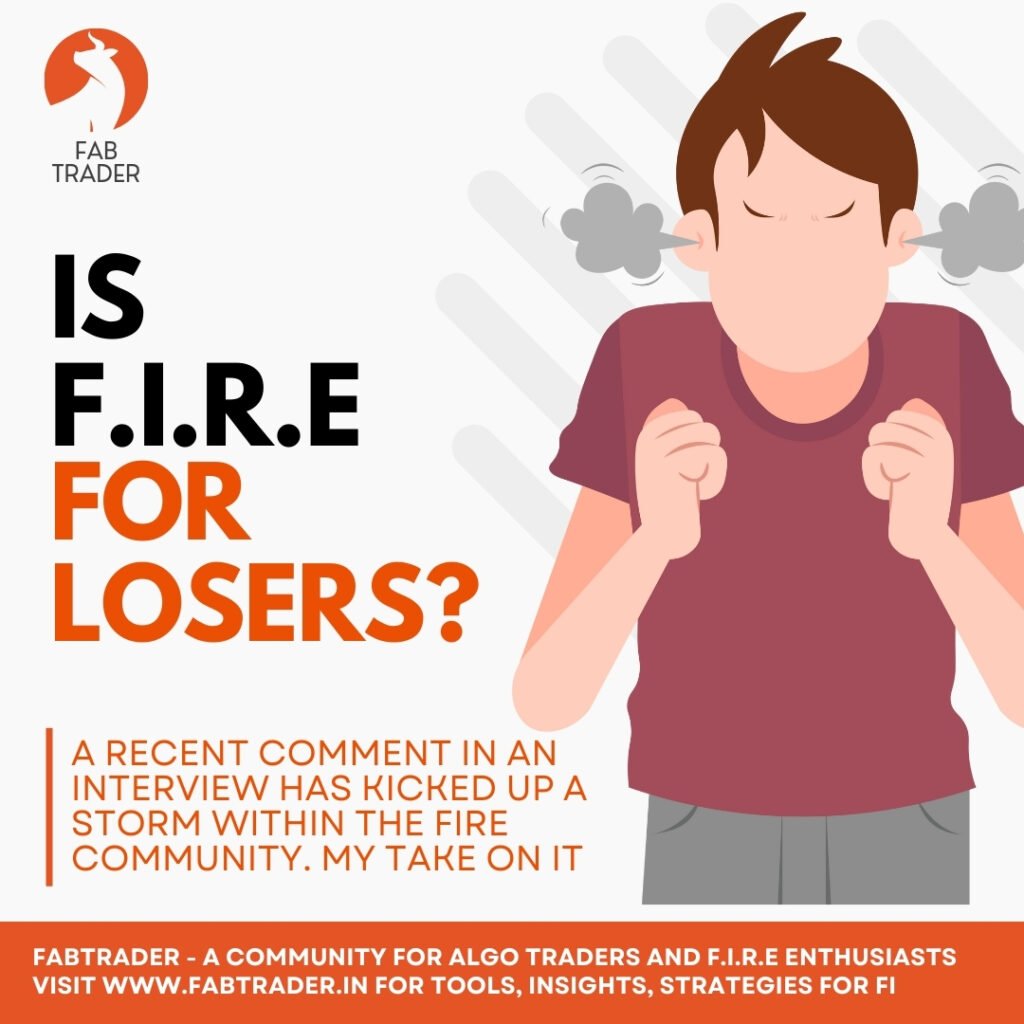
Edit Content

Welcome to FabTrader Community!
Get in touch with me
hello@fabtrader.in


hello@fabtrader.in


In a recent interview, a strong and dismissive opinion was voiced that the F.I.R.E. (Financial Independence, Retire Early) movement is for “losers”—that its proponents are lazy people who should be “fired.” This viewpoint fundamentally misunderstands what F.I.R.E. truly represents.
F.I.R.E. is not about quitting work to sit around watching TV all day. It is not about escaping responsibility or avoiding the challenges of life. Instead, at its core, F.I.R.E. is about achieving financial independence—having the freedom to choose how to spend your time without being forced into a paycheck-driven existence. Retiring early is simply a potential, positive consequence of reaching financial independence, not its sole purpose.
Many critics of F.I.R.E. focus too much on the “Retire Early” aspect while missing the true goal: financial independence. Financial independence means that your assets generate enough passive income to cover your living expenses, removing the necessity of working for money. This shift allows individuals to live life on their own terms, pursue passion projects, contribute to society in meaningful ways, and continue personal growth.
The common narrative that early retirees “stop working” is misleading. Most people who achieve financial independence don’t retire into idleness. Instead, they redirect their energy toward projects, businesses, creative pursuits, or charitable endeavors that bring them fulfillment. The difference is that they now have the choice of what to work on, free from financial stress. They move from being slaves to necessity to becoming masters of their own destiny.
One of the biggest misconceptions about early retirement is that people who retire from their jobs have no purpose. In reality, the opposite is often true. Once financial independence is achieved, individuals are free to focus on work they truly care about.
Some start businesses, write books, create art, teach, or mentor others. Others pursue travel, philanthropy, or scientific research. Many F.I.R.E. adherents become entrepreneurs, using their financial freedom to build businesses without the immediate pressure of turning a profit. Some dedicate their time to family, community, and self-improvement. Instead of grinding in a cubicle to meet someone else’s goals, they work on projects that align with their values and long-term vision.
There is a crucial distinction between working to survive and working to thrive. When your financial needs are met, you no longer have to make choices out of desperation. Instead, you make them based on inspiration.
The traditional retirement model—working 40 years in a job you may not love and then retiring in your 60s—assumes that people can delay living until old age. But life is unpredictable. Health can decline, opportunities can be lost, and burnout is real. F.I.R.E. provides a way to design life intentionally, allowing people to enjoy their most energetic years doing things they are passionate about.
Moreover, F.I.R.E. encourages mindful spending, conscious investing, and financial literacy. It teaches people to live below their means, build sustainable wealth, and avoid the financial traps that keep many people stuck in paycheck-to-paycheck cycles. Critics often claim F.I.R.E. is a privileged pursuit, but in reality, the principles of saving, investing wisely, and seeking financial autonomy can benefit anyone at any income level. It is about reclaiming control over your financial life instead of being at the mercy of an unpredictable job market or economic downturn.
Having personally achieved financial independence, I can confidently say that my life has not become one of laziness or stagnation. Instead, I now have the freedom to work on projects that matter to me—building tools, creating educational content, and helping others on their financial journey. My days are filled with purposeful work, personal growth, and meaningful connections.
Before F.I.R.E., I was caught in the cycle of corporate life, where time was dictated by deadlines, meetings, and the ever-present fear of financial insecurity. Achieving financial independence freed me from that cycle and gave me the flexibility to build a life based on intention, not obligation. It has allowed me to contribute more to society than I ever could while shackled to a traditional job. The energy that was once consumed by job-related stress is now directed toward meaningful endeavors that provide value far beyond financial gain.
The transformation is profound—not just in terms of money but in mindset. Financial independence rewires the way you think about risk, security, and opportunity. It allows you to break free from a life of conditioned consumption and move toward a life of conscious creation.
To dismiss F.I.R.E. as something for “losers” is to misunderstand its essence. Financial independence is not about running away from work—it is about running toward a more meaningful and self-directed life. Those who achieve it are not lazy; they are strategic, disciplined, and forward-thinking. They prioritize financial security, freedom, and fulfillment over consumer-driven lifestyles and mindless careerism.
F.I.R.E. is a philosophy that challenges conventional wisdom. It dares to ask: What if we didn’t have to work our entire lives just to survive? What if we could instead design lives of purpose, creativity, and passion?
The real question is not whether F.I.R.E. is for losers. The question is: Why would anyone want to remain financially dependent when the tools to achieve freedom are available?
F.I.R.E. is not a movement of quitting—it is a movement of winning back your life. It is about designing your days rather than having them dictated to you. And that is something worth striving for.
Disclaimer: The information provided in this article is for educational and informational purposes only and should not be construed as financial, investment, or legal advice. The content is based on publicly available information and personal opinions and may not be suitable for all investors. Investing involves risks, including the loss of principal. Always conduct your own research and consult a qualified financial advisor before making any investment decisions. The author and website assume no liability for any financial losses or decisions made based on the information presented.
Vivek is an algorithmic trader, Python programmer, and a passionate advocate of the F.I.R.E. (Financial Independence, Retire Early) movement. He achieved his financial independence at the age of 45 and is dedicated to helping others embark on their own journeys toward financial freedom.
©2024 Fabtrader.in - An unit of Rough Sketch Company. All Rights Reserved